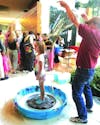Science Hall

Campus community members toured Science Hall Wednesday as part of its 125th anniversary celebration. The building is protected as a National Historic Landmark.
Use the fields below to perform an advanced search of The Daily Cardinal's archives. This will return articles, images, and multimedia relevant to your query. You can also try a Basic search
823 items found for your search. If no results were found please broaden your search.

Campus community members toured Science Hall Wednesday as part of its 125th anniversary celebration. The building is protected as a National Historic Landmark.
The University of Wisconsin-Madison’s Science Hall celebrated its 125th anniversary with a series of events Wednesday, including a haunted tour and a public lecture about the building’s history.
Two Wisconsin companies that trace their origins to federally funded University of Wisconsin-Madison research received recognition in a new economic report Tuesday, according to a university news release.
I spent a month this summer living in a cabin in the Northwoods of Wisconsin.


Imagine an underwater army of crustaceous lumberjacks chopping down the kelp forests on the floor bed of lakes with their large pincers. This isn’t something out of a science-fiction movie. This is how the Rusty Crayfish, an invasive species from Ohio River Basin, essentially deforested Sparkling Lake in Vilas County, Wisconsin.
Dear Mr. Scientist,
On most Saturday mornings, the Wisconsin Institute for Discovery building bears a deserted look. The long lines for coffee are missing, and most of the plush couches in the ground floor hallway are unoccupied.
Ira Flatow, host of National Public Radio’s “Science Friday,” described how science has become “sexy” in America as part of the Distinguished Lecture Series at the Wisconsin Science Festival.
The Wisconsin Science Festival starts Thursday and will continue until Sunday on the University of Wisconsin-Madison campus, generating a local Wisconsin feel as participants can attend sessions teaching the science behind making bratwurst and beer.
It took me a while to start writing this review. I had to sit in the middle of the floor and hug myself, rocking back and forth and muttering “It was just a movie, I should really relax” over and over. I’m at an ideological stalemate here; I usually only reserve the Mystery Science Theater 3000 mantra for movies that I actively dislike because they’re poorly made. But “Prisoners” isn’t poorly made. It’s actually one of the better films I’ve ever seen. But—and imagine now that I’m tugging at my shirt collar and swallowing nervously—that’s the problem.
You’ve seen them on wristwatches, pocket calculators, traffic signals and maybe even on top of campus buildings — futuristic-looking, sleek panels of metal facing the sun. Solar cells are becoming integral to our lives as the technology used to harness arguably the cleanest energy source available —the sun.
Imagine yourself in a situation in which you and everyone surrounding you are being attacked by an unknown predator. You hear signs of chaos all around you and your fight-or-flight instincts are gearing up to protect you from impending doom. You are just about to plan your miraculous escape when you notice your feet are stuck planted to the ground, and you are incapable of fleeing the scene. What would you do to protect yourself?
Dear Mr. Scientist,
University of Wisconsin-Madison political science professor Barry Burden will testify at a commission meeting in Cincinnati, Ohio, Sept. 20 regarding his research under a bipartisan presidential commission exploring how to improve federal elections.
Hearing is an essential function that enables people to take part in daily communication, appreciate music and nature, and enjoy their life.
When exposed to high-stress situations, the normal physiological reaction is for the body to release a hormone called cortisol, which prepares people for a fight-or-flight response to the stressor. However, according to a study done at the University of Wisconsin-Madison in the laboratory of psychology professor Seth Pollak, this reaction does not occur in girls who experienced physical abuse in their developmental years.
You simply can’t remember where you put your keys. It’s fine, happens to everybody and you are just getting older. Good-humoredly, you even start calling yourself “absentminded.” Then, one day, you cannot remember your boss’s last name. You start forgetting the stores you’ve been to, where you went for vacation last year, or what your favorite meal is. You forget how to use the bathroom or when to eat, and the people you care about fade in and out of your memory.
Dear Mr. Scientist,